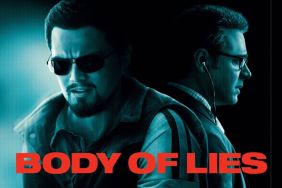Cast:
Leonardo DiCaprio as Roger Ferris
Russell Crowe as Ed Hoffman
Mark Strong as Hani Salaam
Golshifteh Farahani as Aisha
Oscar Isaac as Bassam
Ali Suliman as Omar Sadiki
Alon Abutbul as Al-Saleem
Vince Colosimo as Skip
Simon McBurney as Garland
Mehdi Nebbou as Nizar
Michael Gaston as Holiday
Kais Nashif as Mustafa Karami
Jamil Khoury as Marwan
Lubna Azabal as Aisha’s Sister Cala
Directed by Ridley Scott
Summary:
As disturbing as it is compelling, Ridley Scott has outdone himself with his first modern-day political thriller, delivering his strongest movie since “Black Hawk Down.”
Story:
Roger Ferris (Leonardo DiCaprio) is a CIA operative specializing in Middle East intelligence, finding the terrorists where they live under the command of Ed Hoffman, a cynical CIA veteran who willingly puts Ferris in danger while he sits comfortably back in Washington often making the wrong decisions. After their operation in Iraq goes South, Ferris is restationed in Jordan where he tries to build a relationship with the King’s head of security Hani Salaam (Mark Strong) to infiltrate a terrorist faction stationed there which may lead them to their leader, Al-Saleem (Alon Abutbul).
Analysis:
At this point, true fans of filmmaker Ridley Scott will probably already assume that he can do no wrong, even when he takes a tangent into unfamiliar territory like romantic comedies or quirky character dramas. “Body of Lies” is further proof that he can handle any subject matter, this time tackling modern day real world espionage in a way that should appease fans of both his big movies and his subtle character work. Adapted by William Monahan (“The Departed”) from the novel by David Ignatius, Scott’s latest explores what our government is doing in the Middle East that doesn’t involve soldiers and guns, instead showing the intelligence agents on the street trying to get information using subtler means by working with informants and agents to try and stay one step ahead of the terrorists.
After an apartment complex in Manchester is blown up in a police raid of a terrorist faction, CIA field agent Roger Ferris is in Iraq, using all his skills and connections to find Al-Saleem, the leader of the terrorists responsible for the bombing. He’s working closely with his supervisor Ed Hoffman back in Washington, who continually does things that compromises Ferris’ own plans. When one such operation ends badly, Ferris is seriously injured but instead of taking a desk job, he decides to follow another lead in Jordan, where he must start from scratch in making connections.
One might easily see the appeal of the movie in the sense that Roger Ferris is very much a real-world Jason Bourne, though this is a far more intellectual affair, dealing with the web of intrigue involved with finding the terrorists using agents in foreign credits. Even though the movie’s Iraq sequence ends with a car chase and big explosions reminiscent of Scott’s war scenes in “Black Hawk Down,” the rest of the movie ends up being far more down-to-earth, excelling in the way it shows how the CIA gathers information and deals with the various people an agent might meet in the field. Ferris has everything at his disposal in trying to catch Al-Saleem to the point of setting up a false competing Jihadist organization using very clever methods. The results are similar to “Syriana” though far more focused by being more of a two-hander for two strong screen presences ala “American Gangster.”
Pairing DiCaprio and Crowe is genius as the two mesh well with equally strong performances, DiCaprio continuing the mature roles he began when he started working with Scorsese, giving an incredibly convincing performance as the CIA operative. His Ferris is a well-rounded character with strong morals and convictions driving his every action, though the movie’s more about how those are constantly compromised by his relationship with his superior Ed Hoffman, a character Crowe gives an extra sleazy demeanor with his heavy Southern drawl that makes it even harder to trust anything he says. Much of their interaction is on the phone, but there are a couple great scenes when they’re on-screen together, and despite the serious subject matter, these scenes are very witty, particularly in the way Crowe allows Hoffman to be seen as somewhat buffoonish in his behavior, sort of like how the current administration is sometimes seen. One odd thing to note is how DiCaprio’s character is rarely addressed by name, since for much of the movie he’s referred to by Hoffman merely as “buddy.” It’s another minor thing that adds more realism to the set-up.
As much as the movie’s about the tenuous relationship between Ferris and Hoffman, it’s impossible not to take notice of Mark Strong as the Jordanian head of security Hanni Salaam, a scene-stealing performance in which the British actor holds his own up against Crowe and DiCaprio’s great work. Wearing expensive Saville Row suits and calling everyone “my dear,” Hanni is not one to be trifled with, and Ferris quickly learns how hard it is to gain his trust and even harder to keep it. Hanni’s one condition of cooperating with Ferris’ operation is that those he works with don’t lie to him, something that’s impossible for Hoffman, who’ll do whatever it takes to get the information he wants, to the point of botching Ferris’ operations and relationship with Hanni.
The one point where the movie falters slightly is when it starts showing Ferris’ relationship with a local Muslim nurse, something that suddenly takes us out of the general tone set up in the movie previously. These lighter moments do show that Leo can pull off the charm even in a tough guy role like this, and the nurse does play a key role in the film’s denouement, showing why field agents are unable to have private lives.
Even with the imperfect tangents, the film’s script is nothing short of excellent, maybe one of the best of the year and certainly one that justifies Monaghan’s Oscar. Likewise, it’s hard not to be impressed by the amazing camerawork by Alexander Witt, a long-time Scott 2nd Unit Director who takes over the cinematography using a blend of normal techniques, mixed with CIA field cameras like the innovative Predator System, the proverbial “Eye in the Sky,” which allows Scott to zoom back miles into the air to show the entire environment, an amazing achievement of filmmaking that will probably be lost on 90% of the audience who sees this, as Scott and Witt use this technology in an innovative way to make you see what Hoffman is seeing.
“Body of Lies” isn’t the definitive final word on the subject of terrorism, being more of a cross-section of one CIA agent’s experiences and how he’s pushed to the limit from both sides of the war on terror. Parallels could certainly be drawn to last year’s “Michael Clayton” in the way that Scott pulls this off in a riveting way that keeps you on your toes in terms of what’s real, who is telling the truth and who can be trusted.
The Bottom Line:
Although this may not be the action-packed thriller some may be expecting from Ridley Scott at this point in his career, his unique take on the CIA’s war on terror may be the strongest film to date to cover that subject matter.










